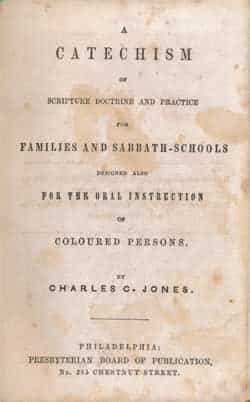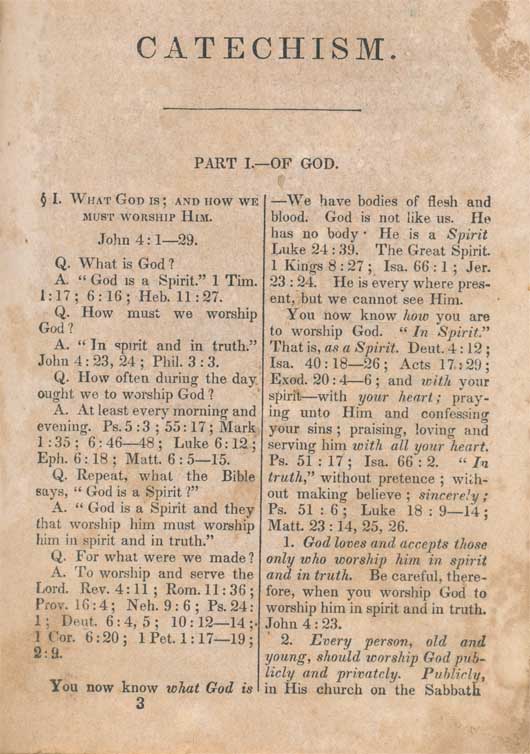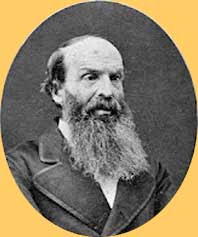This Day in Presbyterian History:
Should Spiritual Hindrances Preclude You From Partaking of Communion?
Presbyterians must have taken November 20 in history as a day off, because this contributor can find nothing significant on this particular day. So we turn to the Larger Catechism questions and answers as they deal with the sacrament of the Lord’s Supper.
On November 14 (read), we saw the important requirement of self-examination with respect to partaking of the Lord’s Supper. Christian Presbyterians cannot state that they don’t know how to prepare for the Lord’s Supper, since this catechism answer tells them all they might wish to know with respect to this preparation.
But the question arises about Christians who have doubts about their spiritual state. Should they refrain from partaking of Communion? That is a question which has perplexed many a church member, and one which teaching or ruling elders have to answer all the time in counseling or home visitations. Larger Catechism No. 172 has the answer.
It reads, “One who doubts of his being in Christ, or of his due preparation to the sacrament of the Lord’s Supper, may have true interest in Christ, though he be not yet assured thereof; and in God’s account has it, if he be duly affected with the apprehension of the want (lack) of it, and unfeignedly desires to be found in Christ, and to depart from iniquity: in which case (because promises are made, and this sacrament is appointed, for the relief even of weak and doubting Christians) he is to bewail his unbelief, and labor to have his doubts resolved; and, in so doing, he may and ought to come to the Lord’s Supper, that he may be further strengthened.”
Two types of Christians are spoken of in this catechism of worthiness to partake of the Lord’s Supper. There may be those in our churches who doubt the fact that they know Jesus Christ as Lord and Savior. This doubt may exist for a variety of reasons, but it is present in their spiritual lives. And as important as the need to find assurance is in a Christian’s life, yet we are not saved by this assurance. We are saved because we have repented of our sins and put our trust alone in Christ alone.
The second type of Christian with whom our catechism answer deals, is the one who has not followed in time spent in spiritual preparation or with sincerity of heart the self-examination proscribed in Larger Catechism Number 171. Should that individual come and partake?
In both cases, our Confessional fathers answer in the affirmative. And the reason being, is that the Supper is designed “for the relief of weak and doubting Christians.” It is a spiritual meal which is appointed just for them. Yes, the doubting believer and ill prepared communicant should “bewail his unbelief.” The word “bewail” is an old English word which speaks of sorrowing over sins of omission and commission. We should put some effort into resolving whatever doubts we have of our personal salvation. Let the Word of God, prayer, the regular worship of God, and fellowship be the channel of blessings which will help us to know with certainty that we are born again.
But, in this matter of the Lord’s Table, we should come expecting the benefit from the Lord Himself, that a reminder of His death, burial, and resurrection will have its proper effect in our hearts, leading us in the work of sanctification.
Words to live by: With monthly or quarterly observances of the Lord’s Supper in our Presbyterian and Reformed churches, there really should be no excuse in being present and accounted for in these observances of the Lord’s Supper. This question and answer however deals with continuing doubts about our salvation in Christ and for one reason or another, failure to properly prepare for the Lord’s Supper. Now that we know that our Confessional fathers have sought to prepare for those two cases of hesitation in partaking of the Lord’s Supper, we can proceed in a more biblical way in dealing with these two cases. Let us respond with the proper spirit of preparation for, and participation in, the Lord’s Supper.
Through the Scriptures: 1 Thessalonians 1 – 5
Through the Standards: Definition of the Lord’s Table, from the Catechisms
WLC 168 — “What is the Lord’s Supper?
A. The Lord’s Supper is a sacrament of the New Testament, wherein, by giving and receiving bread and wine according to the appointment of Jesus Christ, his death is shewed forth; and they that worthily communicate feed upon his body and blood, to their spiritual nourishment and growth in grace; have their union and communion with him confirmed; testify and renew their thankfulness, and engagement to God, and their mutual love and fellowship each with the other, as members of the same mystical body.:
WSC 96 — “What is the Lord’s Supper?
A. The Lord’s Supper is a sacrament, wherein, by giving and receiving bread and wine, according to Christ’s appointment, his death is showed forth; and the worthy receivers are, not after a corporal and carnal manner, but by faith, made partakers of his body and blood, with all his benefits, to their spiritual nourishment, and growth in grace.”
 It was only a year before that Archibald Alexander had been taken under care of the Presbytery of Lexington, Virginia. He was young and extremely small in stature. In our day, such a move of spiritual oversight is usually granted by a Presbytery after it has heard your personal testimony, what God has done for you in Christ in your spiritual life, and an expression of your call to the ministry. In the eighteenth century however, it included all that, no doubt, and also a sermon preached over the presbytery.
It was only a year before that Archibald Alexander had been taken under care of the Presbytery of Lexington, Virginia. He was young and extremely small in stature. In our day, such a move of spiritual oversight is usually granted by a Presbytery after it has heard your personal testimony, what God has done for you in Christ in your spiritual life, and an expression of your call to the ministry. In the eighteenth century however, it included all that, no doubt, and also a sermon preached over the presbytery.



